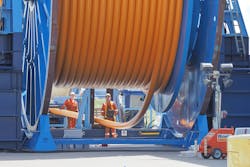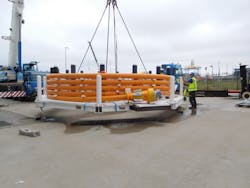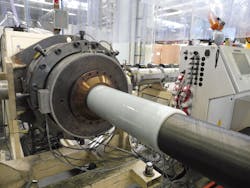Thermoplastic composite pipe evolves to meet industry needs
Dynamic riser qualification under way for deepwater Brazil
Martin van Onna, Airborne Oil & Gas
Adopted and adapted from the aerospace industry, thermoplastic composite pipe (TCP) is now recognized as a viable and cost-effective alternative to steel for hydrocarbon operations and production. With continued investment in its growth and innovation from many of the global supermajors, its rapid journey from concept to commercialization has taken just over a decade.
The field-proven, non-metallic pipe technology can now be found in every oil and gas region, globally. Fully qualified for flowline, jumper and spool usage, TCP lines can be used for full wellstream service (hydrocarbons), water injection, chemical injection, methanol injection, gas lift, and intervention. TCP products can currently be installed and operate at pressures of up to 12,500 psi (862 bar), and in water depths as low as 3,000 m (9,842 ft).
Ongoing testing programs will soon see qualifications for dynamic riser applications amongst its suite of services and capabilities.
Championing composites
Established in 2007, Airborne Oil & Gas has pioneered not only the development and manufacture of the technology but also comprehensive guidelines and industry standards on its applicability.
The company’s initial goal was to develop dynamic TCP Risers for ultra-deepwater but soon realized that the inherent problems associated with steel in the SURF arena, namely corrosion, weight and fatigue, were challenges to be solved in other applications as well, such as flowlines. With TCP Flowline and Jumper now fully qualified and accepted, the TCP Riser development for extreme environments is the company’s current focus.
Eliminating expensive metrology and reducing complex mobilization and installation schedules, the TCP Jumper Spool is a non-conductive, non-corrosive flexible connection between the subsea tree and manifold, that can be easily and safely deployed through a subsea pallet or from a reel off the back of a smaller vessel.
West Africa is a key market for the Netherlands-headquartered business. For the first time, TCP products are becoming a permanent application in the region. This follows the delivery of two, 180-m (591-ft) long TCP gas lift jumpers for the Okwori field offshore Nigeria for Addax Petroleum, a Sinopec subsidiary.
This is the first time the company’s TCP technologies have been ordered through its newly launched ‘Jumper on Demand’ service. This enables long lengths of TCP Jumpers to be manufactured, prepared with dedicated end-fittings, and held in stock. This allows for an improved turnaround of pipe supply, termination, and installation in any location.
It is the fourth TCP order for West Africa this year. At the turn of 2019, Total ordered a 5.2-in. ID, 5,366-psi (370-bar) design pressure TCP Jumper Spool for a deepwater, water injection project. The contract followed the successful completion of a rigorous testing program in which Total qualified the TCP Jumper for permanent subsea applications.
For mature sectors such as the North Sea, TCP is proving its credibility to help enhance production particularly in brownfields for the replacement of old pipelines and/or the installation of gas lift. Within the last three years, the composite pioneer has also permanently installed three TCP Jumper Spools in the North Sea region: two for Anasuria Operating Co. and one for Chevron.
In comparison to rigid steel pipes and conventional unbonded flexible pipes, TCP Jumper Spools can significantly reduce installation, transportation, and fabrication costs. Companies have saved up to 50% on overall investment costs.
Composite collaboration
Shareholders Aker Solutions, Shell, Chevron, Evonik, Saudi Aramco, Subsea 7, and Sumitomo Corp. have all dedicated faith and fortune to the future of disruptive composites for oil and gas applications.
The company is working with operators and the supply chain to investigate cutting the cost of qualifying composite components for subsea use.
The Affordable Composites JIP is expected to be completed later this year. This aims to reduce the need for large-scale tests with ‘certification by simulation.’
The future of TCP
In line with DNVGL-ST-F119, the business has carried out several qualification programs to certify its design methodology, production, and materials for all its products. The company is currently completing the development of:
• Carbon fiber with polyamide 12 (PA12), qualified to 10,000 psi (689 bar) and 82°C (180°F) in use for water injection in the Gulf of Mexico
• Weight coating to give pipes greater stability on the seabed, without having to work with ballast elements or concrete, wire ropes or chains
• Development of ‘smart pipe,’ such as the integration of optical fibers and sensing
• Enhanced insulation for higher temperature applications.
Notably, the company is revisiting earlier intentions to enable the commercial deployment of TCP Dynamic Risers. Qualification is under way with engineering company Símeros Technologies to deliver the first qualified TCP Risers for deepwater Brazil, suitable for presalt and highly corrosive conditions.
The technology is believed to be a world-first for fully bonded, free hanging composite risers and is receiving funding from a major operator in the country. The combination of carbon fiber and polyvinylidene difluoride (PVDF) polymer offers the best alliance of submerged weight, chemical resistance, and minimum bend radius. It aims to be qualified for up to 8-in., 10,000 psi and a temperature rating of 121°C (250°F).
Installed in a free hanging catenary configuration, the company’s lightweight and fatigue insensitive TCP Riser avoids the need to use buoyancy modules.
The qualification program includes rigorous testing with full monitoring by DNV GL and a clear ‘staircase’ approach. This will be a disruptive alternative to conventional risers on the market. The TCP Riser is completely resistant to any form of corrosion, including corrosion stress cracking caused by high levels of CO2 and H2S. It could potentially transform the subsea space with TCP being used for hydrocarbon, water and gas service, in deepwater and dynamic applications.
Expansion and recruitment
As part of the company’s continued investment strategy to increase productivity and capability at its IJmuiden-based facility, it has recently adopted a 24-hour / 7-days-a-week shift pattern in order to deliver larger quantities of TCP to its customers in both onshore and offshore applications.
The company has also doubled its team of skilled manufacturing operators from 25 to 50. The ongoing investment program is yielding improved material processing capabilities in TCP manufacture, in particular: liner extrusion, multi-layer tape wrapping, and coating extrusion.
Based upon these improvements, the company forecasts a sustained period of productivity gains resulting in a five-fold increase in production capacity and capability by the end of 2022 at its Dutch plant. •


